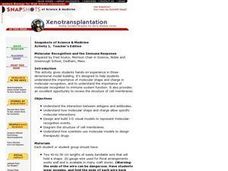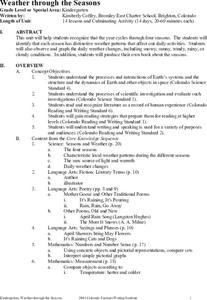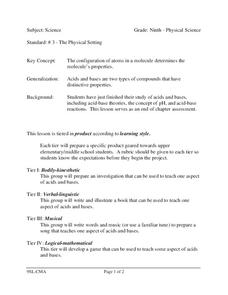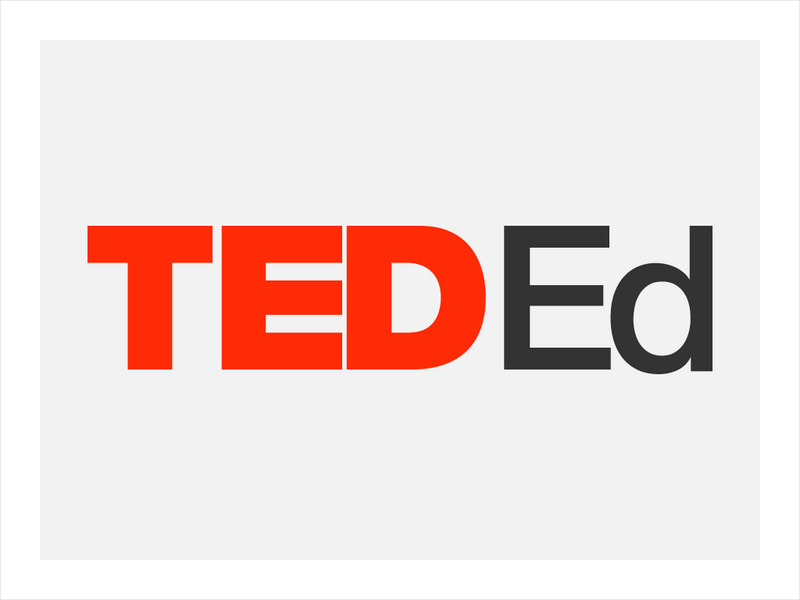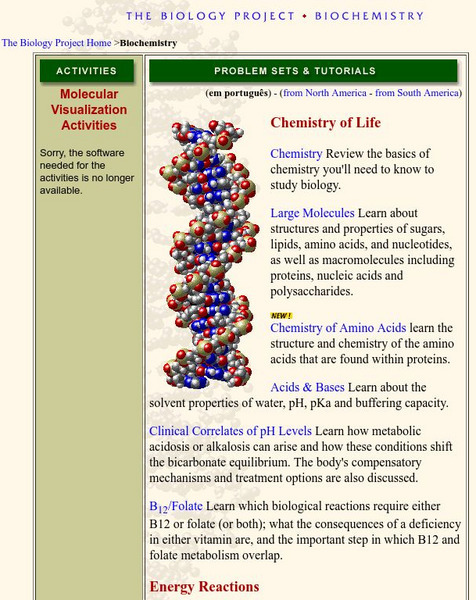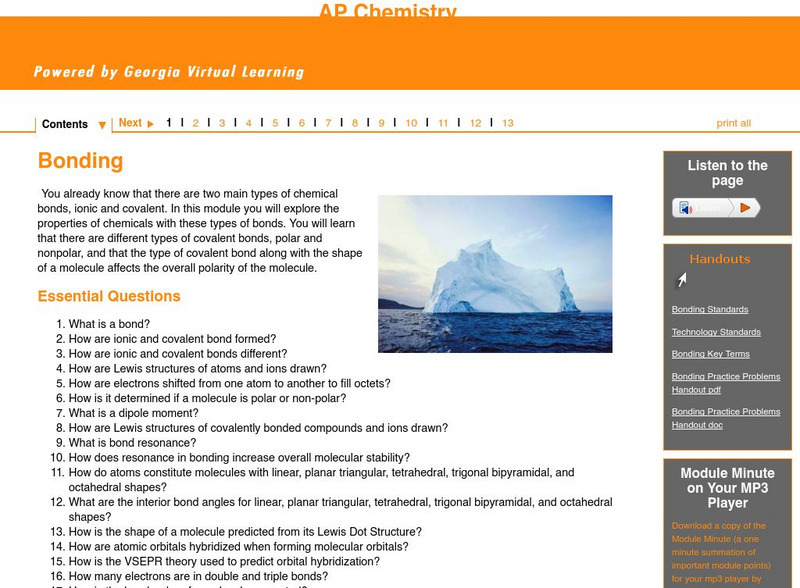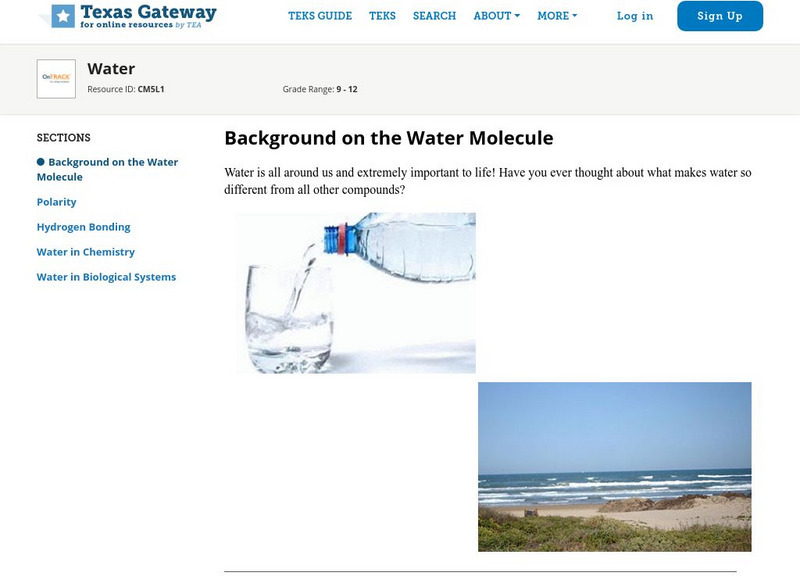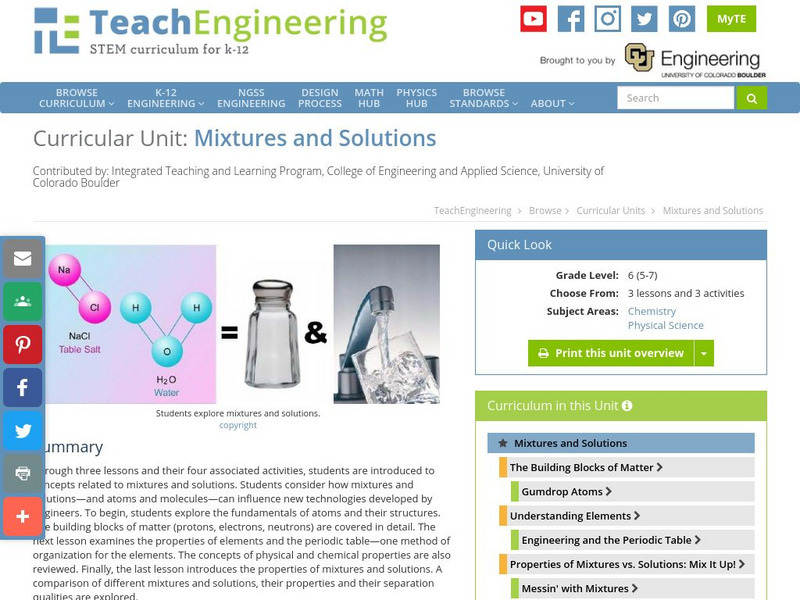Curated OER
Activity #5 Environmental Effects
Students explain the implications of particle theory of The Law of Conservation of Matter for problems of pollution and waste disposal. They describe, in terms of atoms and molecules, what happens to materials when they are dissolved or...
Curated OER
Molecular Recognition and the Immune Response
Learners explore the importance of molecular shape and charge in molecular-recognition. They examine the interaction between antigens and antibodies. Students design and build 3-D visual models to represent molecular-recognition...
Curated OER
Matter
Fifth graders investigate the structure of matter. They examine pictures of atoms and molecules and discuss their relationships, and construct a model of a molecule using toothpicks and gumdrops.
Curated OER
Weather through the Seasons
Students examine the year's cycles by observing the four seasons, their distinctive weather patterns that affect our activities and the weather changes that each brings. The fourteen lessons of this unit offer a good opportunity for the...
Curated OER
DNA Jewelry Models
Students construct a model of DNA to learn DNA structure and decode it to better explain protein synthesis. They also have an actual badge made out of beads of their DNA literacy to wear or use.
Curated OER
The Physical Setting
Ninth graders study the configuration of atoms in molecules to see that it determines the molecule's properties. In this chemistry instructional activity students divide into groups and complete their assigned task.
Curated OER
The Physical Setting
Tenth graders examine chemical reactions. In this chemistry lesson students choose an investigation that they wish to perform based on their interest.
Curated OER
Combination of Atoms
In this atoms worksheet, students review protons, neutrons, electrons, molecules, compounds, and ions. This worksheet has 10 fill in the blank and 3 problems to solve.
Curated OER
Creating Bonds
In this creating bonds worksheet, students create 2-D and 3-D models of the molecular formula provided. Students complete a chart of information about the molecular formula given.
Curated OER
Nutrient Biochemistry
In this nutrient biochemistry worksheet, students complete the blanks with information about nucleic acids and the process. Students also draw a figure referenced in the text given.
Curated OER
Super Scientists Code
In this science worksheet, middle schoolers use the key code on the right to unscramble each of the scientists. They also match each of the scientists found to their correct description.
TED Talks
Ted: Ted Ed: If Molecules Were People
When molecules collide, chemical reactions can occur -- causing major structural changes akin to getting a new arm on your face! George Zaidan and Charles Morton playfully imagine chemical systems as busy city streets, and the colliding...
University of Arizona
University of Arizona: Biochemistry
Problem sets, tutorials, and activities related to biochemistry.
University of Colorado
University of Colorado: Ph Et Interactive Simulations: Build a Molecule
Starting from atoms, see how many molecules you can build. Collect your molecules and see them in 3D!
University of Colorado
University of Colorado: Ph Et Interactive Simulations: States of Matter
Watch different types of molecules form a solid, liquid, or gas. Add or remove heat and watch the phase change. Change the temperature or volume of a container and see a pressure-temperature diagram respond in real time. Relate the...
Simon Fraser University
Chem1 Virtual Textbook: The Basics on Atomic Theory
As part of the Virtual Textbook, this site examines all things related to Atomic Theory including information on atoms, molecules, formulas, equations, nomenclature, and more.
CK-12 Foundation
Ck 12: Molecular Compounds
[Free Registration/Login may be required to access all resource tools.] Students investigate compounds, and learn the ways in which molecules are named.
Georgia Department of Education
Ga Virtual Learning: Ap Chemistry: Bonding
In this module students explore the properties of chemicals with covalent and ionic bonds. Students learn that there are different types of covalent bonds, polar and nonpolar, and that the type of covalent bond along with the shape of a...
American Chemical Society
Middle School Chemistry: Why Does Water Dissolve Sugar?
Explore this animation to learn why water dissolves sugar.
Texas Education Agency
Texas Gateway: Water
Given scenarios, descriptions, or illustrations, the student will determine the properties of water that affect chemical and biological systems.
TeachEngineering
Teach Engineering: Mixtures and Solutions
This unit covers introductory concepts of mixtures and solutions. Students think about how mixtures and solutions, and atoms and molecules can influence new technologies developed by engineers. The first lesson explores the fundamentals...
PBS
Pbs Learning Media: How Cancer Cells Grow and Divide
This animation from NOVA: "Battle in the War on Cancer: Breast Cancer" describes how oncogenes cause cancer and how cancerous cells can spread throughout the body.
American Chemical Society
Middle School Chemistry: Moving Molecules in a Solid
Learners observe and describe, on the molecular level, how heating and cooling affect the motion of molecules in a solid.
American Chemical Society
Middle School Chemistry: The Ups and Downs of Thermometers
Based on experimental observations, students describe, on the molecular level, why the liquid in a thermometer goes up when it is heated and down when it is cooled.



